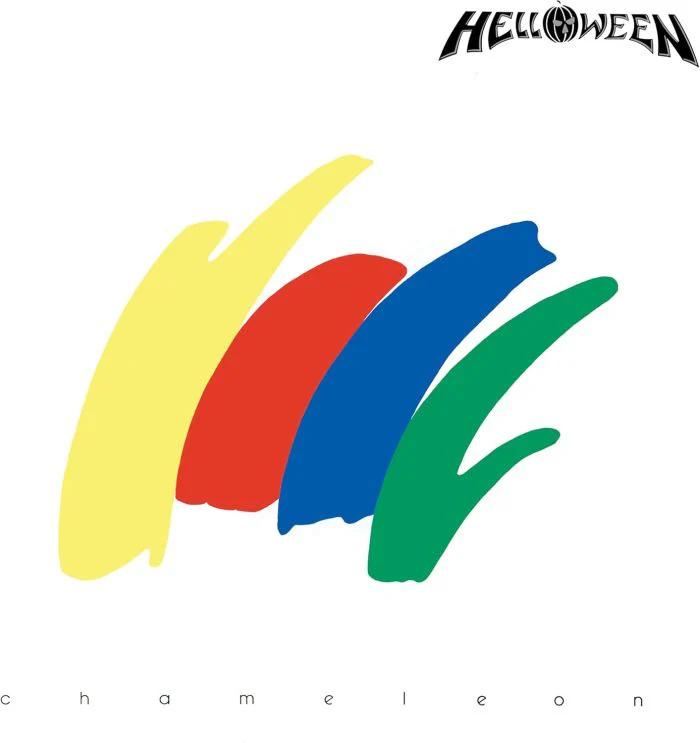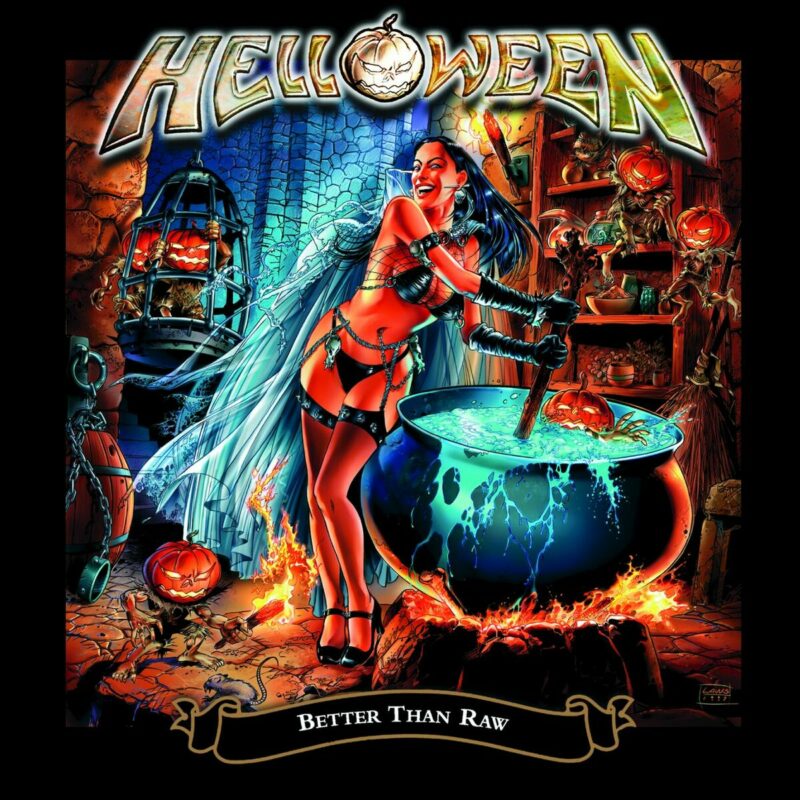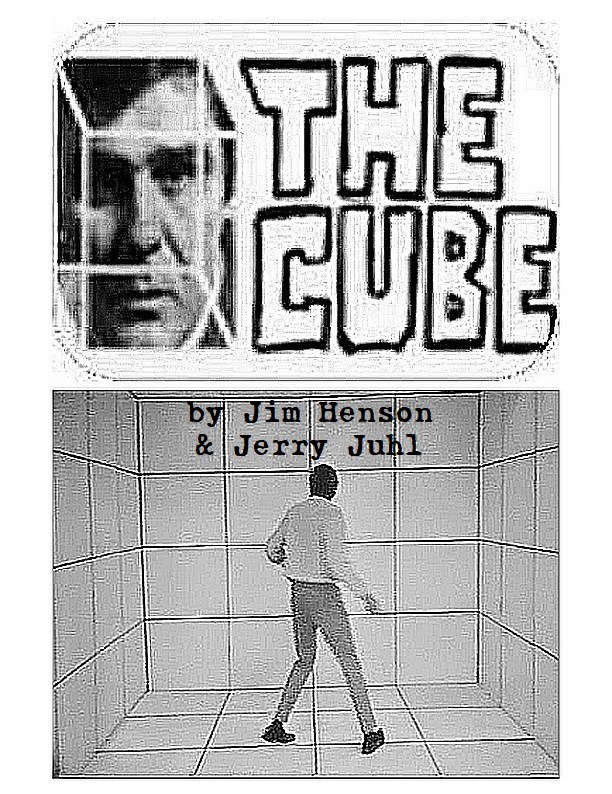A miserable listen. One of the most violently wrong-sounding albums I own. It captures a band ready to break up, and its silly melodies and forced-happy tone gives it a tragicomic “fiddling on the Titanic” tone. The singer was fired three months after its release, and a year after that the drummer jumped in front of a train.
It’s the only Helloween album that gives me no way in, the only one where the question “what were they trying for here?” has no clear answer. The title and cover suggests a band making a statement for artistic diversity: for breaking out of the power metal ghetto, for doing the unexpected. But “weird” is an adjective, not a noun. An approach, not an identity. You can’t have a band founded on sonic diversity and nothing else: that simply means you don’t have a sound. The cover sums things up—it’s colors for the sake of colors, not actually a painting of anything.
In practice, Chameleon is a three-way solo album between singer Michael Kiske and guitarists Michael Weikath and Roland Grapow, who are now apparently communicating through lawyers who end every correspondence with “conduct yourself accordingly”. The hostility in this hate triangle is palpable, and bleeds through on the record. None of them like or respect what the other two are doing, and at times they almost seem to be sabotaging each other. Also present are the ever-reliable bassist Markus Grosskopf, who does what he can, and drummer Ingo Swichtenberg, whose paranoid schizophrenia was sadly worsening, and who clearly hates the Beatles- and Queen-influenced songs more than anyone.
It’s horribly overproduced, and an example of how money can’t make bad music good. Songs like “In the Night” are overwrought and overthought, packed with vocal and guitar and saxophone (?) overdubs to disguise how weak they are. Synthesizers prove a particularly hateful presence: even good songs like “Giants” and “I Believe” have cheesy bleep-bloopy one-finger Fairlight arpeggios on them, of the sort you normally hear on Huey Lewis songs. Abominable. If you’re ripping off Queen, couldn’t you also rip off the “No Synthesizers” sleeve notes?
Michael Weikath’s songs have the largest quality delta. “First Time” is an okay hair metal song that passes without much pain. “Giants” is actually a minor classic, and would have fit well on either Keeper album. It has a heavy as hell NWOBHM-influenced main riff, and the chorus is sublime. “Don’t you, won’t you, say that we’ll be free again!” On the other hand, “Revolution Now” is a droning 70s Jimi Hendrix knockoff that’s eight minutes long. It sounds like Oasis’s Be Here Now, and is equally boring. “Windmill” (or “Shitmill”, in Ingo’s memorable term) is the worst ballad ever written by the band: rank, rancid, and insipid.
Roland Grapow’s songs are largely dull. “Crazy Cat” has some big band flash but no good hooks. You’d have to pay me to listen to “I Don’t Wanna Cry No More” again. “Music” has a Pink Floyd-inspired bridge with some fine single-coil Strat guitar soloing, but otherwise is as unmemorable as its title implies. “Step Out of Hell” is filler burdened with yet more synth cheese.
Michael Kiske was never the band’s greatest songwriter. Here, he offers a surprise in “I Believe”, an emotionally bludgeoning but effective ode to faith that’s nearly a masterpiece. It has some wonderful ideas in the Iron Maiden/Manilla Road vein (ironically, he’d soon swear off heavy metal entirely), but it’s just too long and draggy. It needed some tempo changes in the middle. Still, I think this might be the album’s finest track. “When the Sinner” is overlong and mediocre at best, and is overloaded with questionable ideas (if you’re one of the millions of fans who thought “Helloween would sound much better with alto sax solos”, then I’ve got the album for you.) The Paul McCartney-esque “In the Night” is just too sonically confused to stay in the memory.
Not only did Helloween tear to shreds what made them successful, they replaced it with…nothing. Just shallow, derivative imitations of other bands and styles. Chameleon has two good songs and ten bad ones, with saxophones and synthesizers. At times it seems like a practical joke. At least they released it in 1993, when the world’s appetite for retro-progressive dad rock was at an all time low. The album’s title feels appropriate: it was literally invisible.
No Comments »
What does the title mean? That, I can’t tell you. It’s an excellent power metal album, however. Time of the Oath was 25% better than Master of the Rings; Better than Raw is 25% greater again. Everything locks into place here. Music, tone, style, production, performance. It’s distinct from anything Helloween made before, yet feels like a summation and endpoint of their 90s style: great songs, performed with panache and energy. Helloween wasn’t just out of “comeback hell” in 1998, they producing melodic power metal that compared decently against their classic 80s run (Walls of Jericho plus Keeper of the Seven Keys I and II).
All of the musicians more than pull their weight, but one of them steals the show. Uli Kusch’s drumming is so damned good here—flashy and technical, yet in-the-pocket and lively. Listen to the way he anchors the start of “Push”—tight triplets on the kicks, with sharp, precise hats punching Markus Grosskopf’s bubbling bass into place like steel tentpegs—or the unyielding chaos of “Midnight Sun”—where flurries of wild snare and tom fills swoop and overtake each other like crazed birds. He adds such interesting skeletons to fairly average midpaced fair like “Hey Lord!” that they seem absolutely compelling.
This might be the most balanced Helloween album from a songwriting perspective. Four songs by Uli, four by Weikath, four by Deris. This is the only 90s Helloween album to have absolutely no songs credited to lead guitarist Roland Grapow, but I happen to know he “ghosted” a fair bit on Uli’s songs. The staccato guitar riff in “Revelation” was written by him, for example.
“Push” is fast. “Falling Higher” is even faster. Tommy Hansen’s production is dated, archaic and rough, with bits of dust seeming to cling to the cracks in every note. I think this was the last time they ever worked with Hansen, and represents another breaking point with their classic power metal style. Subsequent albums had a more modern (sometimes too modern) sound.
There are some recondite progressive rock touches in the album’s second half, which, unlike Chameleon, are well done and don’t seem too distinct from the band’s core style. “Time” and “A Handful of Pain”.
The worst song is probably Weikath’s “Lavdate Dominum”, which listens like a goofy punk rock song, or a heavy metal cover of some Christmas carol. I don’t know what the idea was here. He also gets the album closer, “Midnight Sun”, which is really good; extremely lengthy and technical while also fraught with emotional agitation. One of Deris’s great vocal tracks is on this song.
There are two great songs, that are pretty much in the top 10 greatest Helloween tracks every time I make a list. The first is Uli Kusch’s “Revelation”, an amazing, warp-speed epic that seems to be a jaded postmodern take on the Bible. Astonishing shifts in feel and tempo, solo after solo, weird digressions into funk rock and thrash, the album’s greatest chorus…Worlds form, collide, and break apart inside this song.
The second is a complete surprise. “I Can” is one of the hardest sellouts Helloween ever sold, literally being an alternative rock song that sounds like New Order’s Get Ready more than anything, But it’s extremely well-written, compact, and catchy. I’m glad they didn’t go further into the territory explored here, but man, I’m glad they planted a flag at least this far.
1998-2000 was the era where power metal became incredibly competitive: bands like Gamma Ray and Stratovarius were in the middle of career-defining hot streaks, newcomers like Freedom Call even America was finally becoming relevant again thanks to Virgin Steele and Kamelot. Better than Raw ranks alongside the best of that period.
No Comments »
In 1969, Jim Henson locked a man in a box and let him die. Don’t worry, it was just for a movie. A movie that now gathers dust in the LAPD’s evidence room inside a locked crate marked “Too horrifying to watch”. How does it gather dust inside a locked crate? Good question.
Let’s talk about The Cube, a Henson-directed telefilm from the same year.
A man is trapped in a white room. He doesn’t know how he got there, and can’t leave. People enter the room through mysterious doors (which only they can see and use), and do things to the man that might be pranks, might be torture, or might be attempts to enlighten him. They rave, threaten, lie, confabulate, explain, offer hallucinatory narratives about what’s happening, then leave. The man is still in the cube.
Henson made films about puppets. The Cube depicts a man (played by Richard Schaal) who’s metaphysically a puppet: he lacks free will, and is at the mercy of his unreliable senses. That’s the simplest reading of The Cube: we are locked inside our own minds: trapped in a skull-box, grasping at threads and slivers of light and sound spilling through pinholes and cracks and fissures, seeking meaning in the pale, languid eidolons, trying to infer the world buzzing outside the cube—a world we can never actually visit, because it would mean stepping outside the boundaries of our own awareness. We are prisoners of the sensorium. And it’s lying to us.
The 60s were a decade made for such questions. Marijuana. LSD. MKULTRA. Postmodernism. The edges of reality and perception were being tested and rewritten and overturned. Science accelerated cultural derealization: we could actually examine an eyeball, and see all the kludges and hacks holding our vision together: see the bloody lattice of veins and arteries spread across the retina, see the optical nerve which interrupts our vision (a blind spot that the brain edits out with a patchwork of surrounding data), see how the sensory sausage is made.
In 1967—one year after Henson and Muppets co-writer Jerry Juhl wrote The Cube‘s screenplay—Doreen Kimura conducted her famous dichronic experiments, revealing the mangled patchwork of the human auditory system. Simply put, aural pathways from our ears to our brain “cross over” inside our heads—what the left ear hears goes to the right side of the brain, and vice versa. But the left hemisphere is dominant for language tasks: so when human speech (for example) enters the left ear, the signal must make an additional trip from the right side to the left via the corpus callosum for processing, adding a few-millisecond delay to the sound. To compensate for this, the brain does the same thing a laggy online videogame does: by artificially delaying the signal from the right ear, so that both left and right stereo signals match. Essentially, your ears hear things happening later than they actually did. The brain coheres all this into a singular experience, a singular sound, but it’s an illusion.
The Cube could be viewed as a metaphor about scientific derealization. It also has religious readings. A Christian Scientist turned hippie, Henson likely had at least a remedial understanding of Buddhism, and The Cube kind of works as a dramatization of three “marks of existence”: Impermanence, suffering, and selflessness.
Anicca: all is impermanent. Reality inside the cube is unsettled and ill-defined. A mud that swirls into new shapes every time The Man tries to touch it Objects and people suddenly appear that weren’t there before. The words of his visitors are no more reliable: often they’re palpable lies, or contradictions. He meets a prisoner called Watson, who claims to have spent a very long time in another cube—how long, he cannot say, because when he tried to mark the passage of days on his thumbnail, they tore it out. (This itself is rugpulled: the man is later described as an actor, playing a role…which is true, of course. None of these events are happening. The Cube is a 1969 TV movie directed by Jim Henson.) There’s a layer of metafiction, as the man sees himself on a TV screen, and must process the implications.
Dukkha: all is suffering. The Man is sent reeling through psychological states. Hope, horror, amusement, confusion, sexual desire, anger. All are useless in the cube. His actions aren’t totally meaningless—people react to him, such as two clowns (the first is apparently a parody of Eddie Cantor) who become savagely angry when The Man fails to laugh at them—but he can’t escape the cube. He’s like a ball in a pinball arcade cabinet: it whips around at dizzying speed, racking up points on bumper after bumper, but will fundamentally never escape the cabinet. The cube is a hell twisted into the shape of a Kline bottle. There’s nowhere to escape, except straight back into it.
Anattā: lack of self. The Man (for he is indeed all men), is the most Hensonian of objects: a puppet. Kermit might have form and shape, but he is hollow cloth with sawed-in-half eyes. His behaviors are supplied by the ghostly demonic hand twisting inside him. Likewise, the Man has no name, and no memories. The torments he is subjected to are nonsense…but in a sense, they’re all that’s real in The Cube. A coquettish seductress walks into the cube, seems to be trying to seduce him…and then reveals it was all an act. This is cruel…but was it really fake? The lust the man felt was real. So is the anger he feels after the prank is revealed. In a sense, she has provided him with what he lacks: an identity as a lustful, angry man. Without the external world torturing him, he would just be nothing. Nothing whatsoever.
Maybe The Cube is simply a freeform Rorschach blot onto which the audience imprints their own meaning. It certainly has a hippie-esque “it’s so deep, man” vibe. And what’s the hippie term for a prisoner of the system? A square. And what’s a cube made of…?
The problem with a film about meaninglessness is that it can quickly shade into the film itself lacking meaning. The Cube does not quite reach that point, but if it had gone on longer than 60 minutes, it probably would have. The Cube is strange, challenging, but perhaps ultimately a bit shallow. Eventually, you get the idea. It’s all a weird, dark game that he’s better off not playing. Instead, even at the end he’s still basically falling for the idea that there’s some “deep reality” that he can reach beyond these shifting stands. Most of the film consists of arbitrary events, that could probably be rearranged in nearly any order with no loss of meaning.
Many of the tricks played on The Man are also tricks on the viewer. A strange monklike figure gives him a mystic artifact called a Ramadar, which might be key to his salvation. But all the Ramadar seems to do is make an annoying buzzing sound, and he smashes it in frustration. Is this a metaphor for the impossibility of enlightenment, or just another red herring? You decide.
The mind is a dark place where all of us live, yet none of us live. And certainly, it is not a place we can escape. My dad had a running joke (likely stolen from some comedian), that old TVs had dust traps down the bottom, and after you watched an old western, you had to empty out all the dead Indians from the bottom of your TV, before they started to smell. They were probably happy to go. They escaped the cube.
No Comments »



